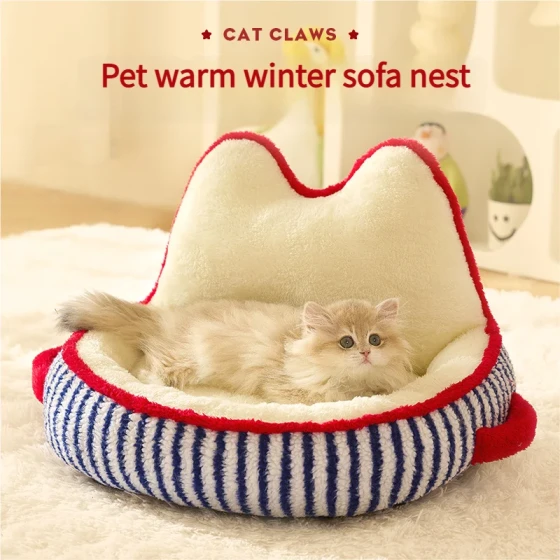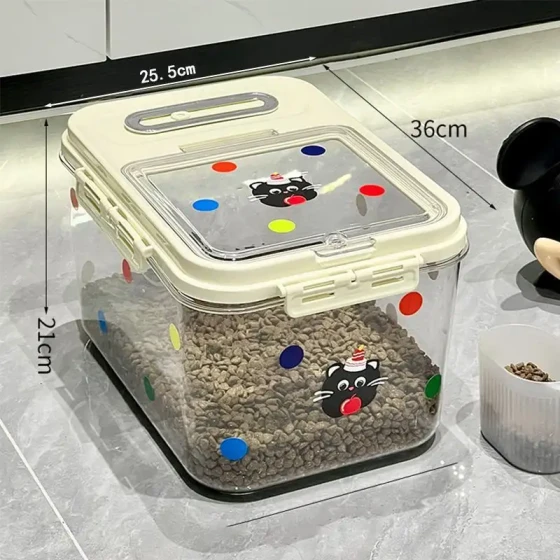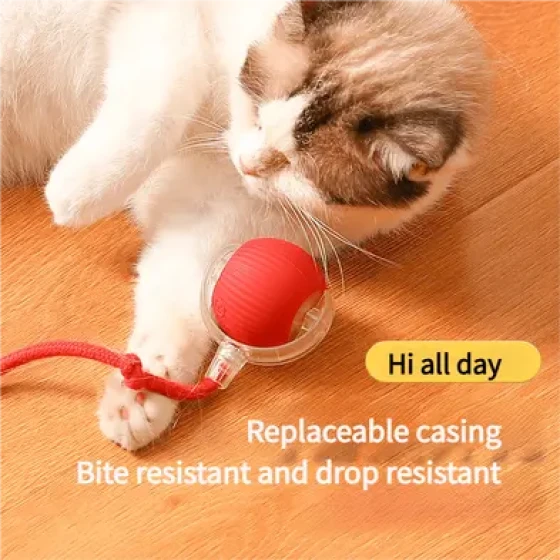Girl feels sick after long-term sleeping with cat_Health risks to beware of when sleeping with pets
Long-term sleeping with cats may indeed bring some potential health risks to the human body, including allergic reactions, parasite infections, and sleep quality issues. Although many people enjoy the comfort and sense of security from close contact with cats, it is crucial to understand these risks and take appropriate preventive measures, especially for vulnerable groups such as pregnant women, infants, the elderly, and those with underlying conditions.
Sleeping with Cats: Health Considerations Behind the Sweetness

Cats, as popular household pets, having intimate interactions with their owners is nothing new. Many "cat owners" like to sleep with their "master" on the same bed, enjoying this warmth and companionship. However, behind this seemingly heartwarming scene lie some health risks that should not be overlooked. These risks are not sensational but stem from bacteria and parasites that cats may carry, as well as their living habits, which may impact human health.
Hidden Health Risks Should Not Be Underestimated
The health risks that may result from sleeping with cats mainly focus on the following aspects:
1. Allergic Reactions: Sneezing, Runny Nose, and Asthma Troubles
Cat hair, dander, saliva, and urine are common allergens. For those with allergies, prolonged close contact with these allergens, especially being in an environment full of cat hair and dander during sleep, can easily trigger allergic reactions. Symptoms may include sneezing, runny nose, red eyes, itchy skin, and even more severe respiratory diseases such as asthma. Even without a clear allergy history, long-term exposure may induce allergic reactions to cats.
2. Parasite Infections: Invisible Threats to Beware
Cats, especially those who often go outside or eat raw meat, may carry various parasites. Although indoor cats can reduce risks through regular deworming, infection cannot be entirely ruled out. Sleeping with cats, especially if your skin is broken or you come into contact with cat feces, increases the risk of parasite infection. Common parasites that may be transmitted to humans include:
- Toxoplasma gondii: Toxoplasma oocysts are mainly excreted through cat feces; humans can be infected by contact with contaminated litter or soil or by eating undercooked infected meat. Most people with a healthy immune system experience mild or no symptoms when infected, but for pregnant women, toxoplasmosis may cause fetal malformations, miscarriage, or stillbirth, seriously affecting fetal health.
- Roundworms and Hookworms: The eggs of these intestinal parasites can be spread through cat feces. Humans, especially children, may accidentally ingest parasite eggs if they do not wash their hands thoroughly after contact with contaminated soil. Infection can cause larvae migration inside the body, leading to coughing, fever, abdominal pain, and in severe cases, vision impairment.
- Fleas and Mites: Fleas and mites on cats not only cause severe itching for the cats but may also bite or parasitize human skin, causing itching, rashes, and discomfort. Fleas can also transmit bacterial infections such as cat scratch disease.
3. Bacterial Infections: Small Scratches or Bites Can Cause Trouble
The mouth and claws of cats may carry bacteria. Even a small scratch or bite from a cat can lead to bacterial infections. Common bacterial infections include cat scratch disease caused by Bartonella henselae, which can cause swollen lymph nodes and fever. Additionally, cats may transmit other bacteria such as Pasteurella, commonly found in their mouths, which can cause local infections when transmitted through bites, and in severe cases, systemic infections. Some methicillin-resistant Staphylococcus aureus (MRSA) infections are also associated with pet transmission.
4. Impact on Sleep Quality: Person and Cat Sleep Cycles Misaligned
Cats are crepuscular animals, most active at dawn and dusk. If you are a light sleeper, a cat's nighttime activities, such as jumping up and down suddenly, kneading on you, or making noises, can disturb your sleep. Chronic sleep deprivation not only affects mental state but may also negatively impact physical health.
Reduce Risks and Live Peacefully with Your "Master"
Although these potential risks exist, it does not mean you cannot keep close contact with cats. By taking scientific and effective preventive measures, the health hazards from sleeping with cats can be greatly reduced.
- Maintain cat health: Take your cat for regular health check-ups, vaccinate on time, and deworm both internally and externally. Avoid feeding raw meat to reduce the risk of parasite infections.
- Focus on personal hygiene: Always wash your hands thoroughly after contacting cats, especially after cleaning litter. Avoid allowing cats to lick your face or wounds.
- Maintain home cleanliness: Regularly wash your cat’s bedding, toys, and your own bedding preferably with hot water to kill possible parasite eggs and bacteria. Use a vacuum cleaner, especially one with a High-Efficiency Particulate Air (HEPA) filter, to effectively remove cat hair and dander from indoors.
- Consider sleep arrangements: If you have allergies, weakened immunity, or your cat’s nighttime activity seriously affects your sleep, consider letting the cat sleep in its own dedicated cat bed rather than sharing your bed. You can place an air purifier in the bedroom to help filter airborne allergens.
- Define "safe zones": Try to prevent cats from entering kitchen or food preparation areas to avoid contact with your utensils.
Special Groups Should Be Extra Careful
The following special groups have relatively higher risks when sleeping with cats and need to be more cautious:
- Pregnant women and women planning pregnancy: Toxoplasmosis can seriously harm the fetus; it is recommended to avoid cleaning cat litter during pregnancy or have family members do it.
- Infants and children: Children's immune systems are not fully developed and are more susceptible to infections. They also tend to accidentally contact cat feces or hair while playing.
- The elderly: Elderly people have relatively weaker immunity and are more affected by infections.
- Immunocompromised individuals: Those undergoing chemotherapy, organ transplants, or with immune system diseases have a higher risk of zoonotic diseases and should consult doctors about sleeping arrangements with pets.
Common Questions and Answers
Q: Can parasites on cats transmit to humans?
A: Yes, parasites on cats, such as Toxoplasma, roundworms, hookworms, fleas, and mites, can potentially transmit to humans under certain conditions.
Q: Will sleeping with cats cause allergies?
A: For people allergic to cat hair, dander, etc., long-term sleeping with cats increases the risk of allergic reactions, which may lead to sneezing, runny nose, itchy skin, and even asthma.
Q: How to determine whether a cat carries parasites?
A: Some cats infected with parasites may not show obvious symptoms. The most reliable method is to take cats to a veterinary hospital regularly for fecal examinations and external parasite checks.
Q: Does regular deworming completely eliminate health risks?
A: Regular deworming greatly lowers the risk of parasite infections but cannot completely eliminate all health hazards, such as bacterial infections and allergic reactions that may still occur.
Q: I am allergic to cat hair but want to get close to cats. What should I do?
A: If allergy symptoms are mild, you can reduce symptoms by maintaining home cleanliness, using air purifiers, and frequently washing bedding. Avoid allowing cats in the bedroom, especially avoid sleeping in the same bed.
Conclusion
Living with cats undoubtedly brings much joy and comfort to our lives. The benefits of this companionship, such as stress relief and alleviating loneliness, should not be overlooked. However, as responsible pet owners, understanding potential health risks and actively taking preventive measures is a responsibility to both our own health and the cats’ health. Scientific pet care and attention to hygiene can make this cross-species friendship longer-lasting and safer.
-560x560.webp)




